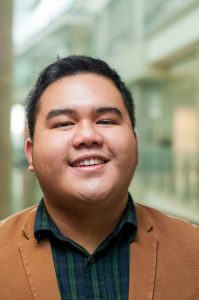
In their final year, with convocation on the horizon, many undergraduates talk about coming back to university for a graduate degree after they work for a few years and put some money in their pockets. New grad LJ Valencia now knows exactly what it’s like to see that plan through. A proud Edmontonian, Valencia came to UofT to complete his MA in September of 2023 after working for three years upon his graduation from the University of Alberta with a degree in economics and political science. Torn between thoughts of joining the job market and graduate studies, he decided to take some time and consider his options.
“I actually graduated in 2020 into a job market that was really tough,” Valencia remembered. I was lucky, though. First, I worked at Western Economic Diversification Canada. We worked on projects to inform policy direction and federal investments to diversify Western Canada’s economy. Later, I moved to the Bank of Canada where I was a research assistant for two years, working in a software project and the short-term Real GDP forecasting team.”
Even with professional experience to draw upon, the life of a graduate student presented new challenges for Valencia to master.
“Balancing TA responsibilities and my full-time academic commitments was challenging,” he said. “You learn a lot about how to manage your time by juggling multiple things like marking midterms and running office hours.”
The Department of Economics Master’s program is a coursework only program with a diversity of courses that can be combined to create an individualized program shaped to the students’ goals depending on whether they wish to become professional economists, economics consultants, to work for government agencies, or in laying the groundwork for a PhD program. There are general skills that students gain across the board.
“A master’s program provides a set of tools and understanding you wouldn’t necessarily gain in industry,” Valencia said. “It really comes into play in my current work, helping me daily. It’s good to have that foundation, to build out my toolset, and to gain a formalized understanding of how things work, especially in understanding economic activity.”
Valencia now works as an economic analyst at Desjardins Economic Studies here in Toronto, a position that uses both his past professional experience and his newly earned MA.
“A lot of my work in my current job relates heavily to what I used to do at the Bank of Canada,” he said. “After being out of school for three years, the master’s program gave me a better perspective, providing alternative ways of approaching and looking at problems. These are things you need when you work as an economist in general, but when it comes to a master’s program, it’s not all about what it can do for your career. There are also the lifelong connections you make! I’ve spent a fair bit of time in the masters’ student rooms in the basement of Max Gluskin House studying with my friends and, you know, there are a lot of amazing memories that come out of that experience.”
Return to the Department of Economics website.
Scroll more news.
